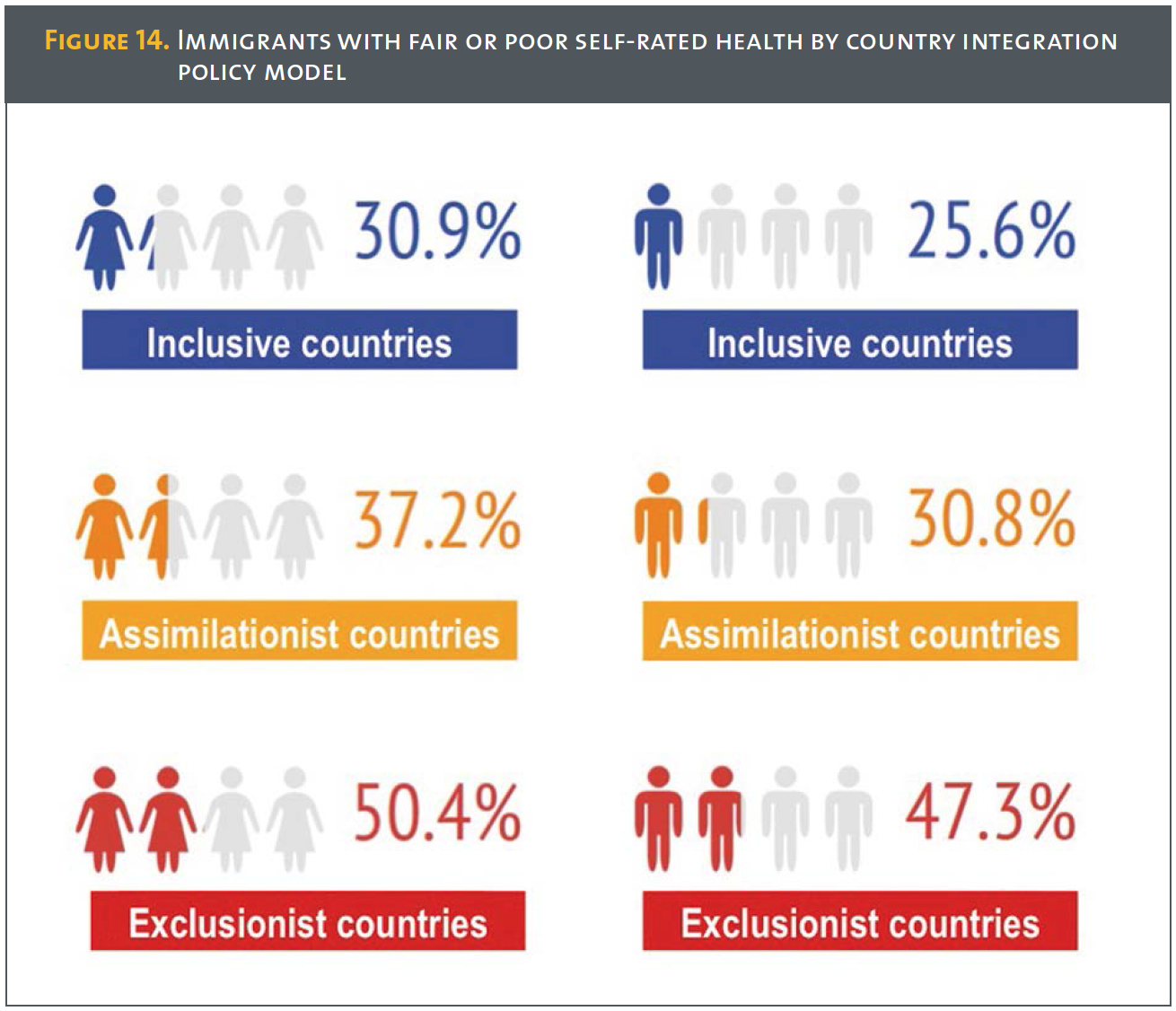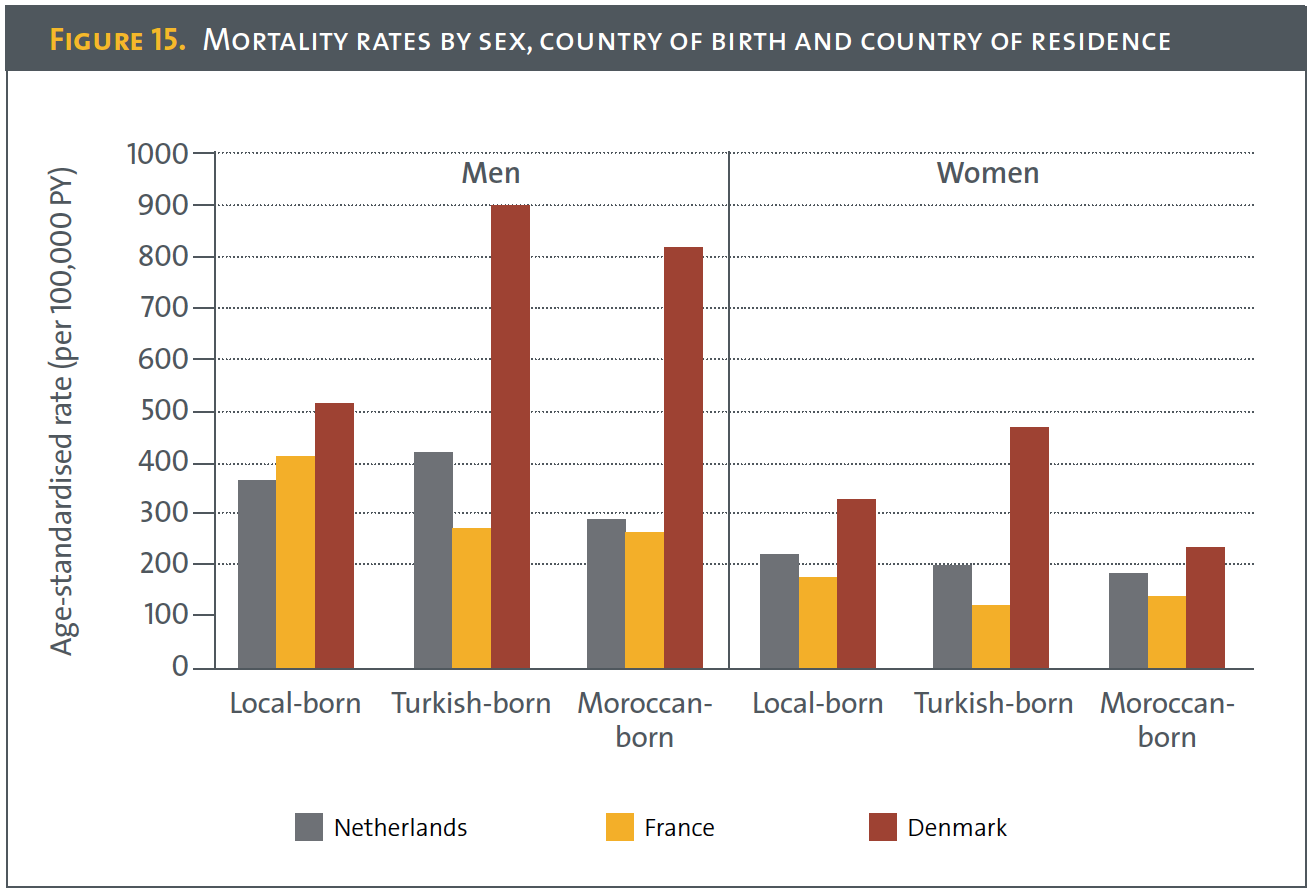Migration

The evidence on the health of people migrating from low and middle to high-income counties is consistent with the so-called "healthy immigrant effect": recently arrived immigrants have generally better health than the native population, but this health advantage is frequently observed to deteriorate or even reverse with increasing time of residence.
Very little is known on how policies on immigration control and integration throughout Europe might be affecting the present and future health of immigrant populations, a question of crucial relevance if we consider that people with an immigrant background constitute an increasing proportion of the EU population.
Main findings
Immigrants in 'exclusionist' countries suffer poorer health
We compared health inequalities between natives and immigrants across European countries that have implemented different integration policy models:
We studied self-rated health using survey data from the 2011 European Union Statistics on Income and Living Conditions by comparing individuals born in the same country of residence or outside the EU and who have resided for 10 years or more in the country (2). We analysed mortality data from the Netherlands (inclusive), France (assimilationist) and Denmark (exclusionist) with comparisons of people born in Turkey or in Morocco (origins well represented in the three countries) with people born in the same country of residence (3). Using the European Social Survey 2012, we compared depressive symptoms in individuals born in their country of residence or who were born in less economically developed countries (4).
Inequalities in living conditions and self-rated health among immigrants and natives were highest in exclusionist countries (see Infographic "Immigrants' health and integration policies in Europe") (2). Immigrants also had the highest mortality in Denmark compared to their compatriots in the Netherlands and France (3). Inequalities in depressive symptoms were also largest in exclusionist countries followed by assimilationist countries, and particularly in countries such as Switzerland and Denmark that were poorly ranked in integration policy comparisons (4).
Discrimination and health among persons with immigrant backgrounds in Europe
We used the European Social Survey of 2012 to study the association of perceived membership to a discriminated group and three health indicators among people born abroad or with both parents born abroad (excluding IMF advanced countries), taking into account gender, generation and country integration policy. Perceived membership to a discriminated group was associated with poorer health outcomes, mainly depression, only for first generation immigrants, and among those, especially in assimilationist countries (5).
Healthcare exclusion in Czechia
In Czechia, regular immigrants without permanent residence are not entitled to public health insurance and must purchase private insurance. With this system, we found that the real access to health services of these immigrants is much lower than that of Czechs and permanent residents (6). Even among these permanent immigrants, many lack knowledge of their rights and remain out of the public system (7).
(1). Meuleman B. The influence of macro-sociological factors on attitudes toward immigration in Europe. A cross-cultural and contextual approach. KU Leuven Dissertation, 2009, pp.228-236.
(2). Malmusi D. Immigrants' health and health inequality by type of integration policies in European countries Eur J Public Health. 2015; 25:293-299.
(3). Ikram UZ , Malmusi D, Rey G, et al. Association between integration policies and immigrants' mortality: an explorative study across three European countries PLoS ONE. 2015; 10(6):e0129916.
(4). Malmusi D, Palència L, Ikram UI , et al. Social, economic and political determinants of inequalities by immigrant status in depressive symptoms in Europe. Forthcoming. PPT.
(5). Borrell C, Palència L, Bartoll X, et al. Perceived discrimination and health among immigrants in Europe according to national integration policies Int J Environ Res Public Health. 2015; 12 (9):10687-99.
(6). Malmusi D, Drbohlav D, Dzúrov´ D, et al.Inequalities in healthcare access by type of visa in a context of restrictive health insurance policy: the case of Ukranians in Czechia Int J Public Health. 2014; 59:715-9.
(7). Dzúrová D, Winkler P, Drbohlav D. Immigrants' access to health insurance: no equality without awareness. Int J Environ Res Public Health. 2014; 11:7144-53.
Policy implications
Different integration policy models across Europe appear to influence immigrants' health.
Adopting restrictive policies regarding immigrant integration may have health consequences.
Legal barriers in the entitlement to public healthcare systems hinder immigrants' access to necessary care.
Research team
Migration studies in SOPHIE were part of Work Package 5 (Cross-cutting evaluation of policy impacts on gender and migration-related health inequalities), which has been led by Carme Borrell and Davide Malmusi, Agència de Salut Pública de Barcelona.
Other partners involved were Charles University in Prague and Academic Medical Center.




